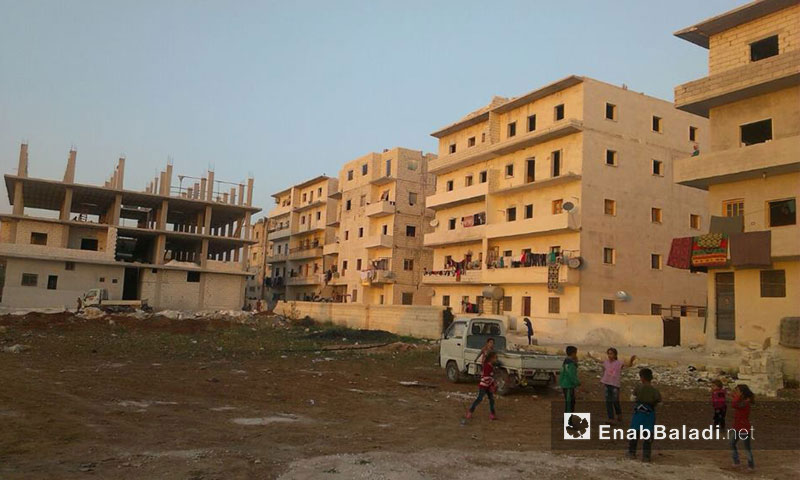Building projects and construction activity are increasingly being witnessed in Idlib’s western countryside especially in the relatively safe towns of Harem, Salqin, Sarmada and Kafr Takharim. The towns are considered safe when compared to the remaining areas within the province that experience continuous bombardment by Russian and Syrian regime planes.
Many factors have pushed contractors and organizations to launch building projects, but the safety factor is considered the most important. Other factors are the towns’ proximity to the Turkish border, their distance from the areas of armed conflict and the large number of internally displaced persons from other provinces coming to these areas.
On the economic level, other than the financial gain the contractor achieves with the project, construction projects revitalize the economy in the area and provide jobs for laborers whose only other opportunity to find a source of income is migrating to Turkey.
Turkey: the sole artery
The Bab al-Hawa border crossing point between Syria and Turkey is considered the only artery for construction projects as all building material, cement, metal and sand enters Idlib’s western countryside through the border crossing point, according to contractor Iyad Fatomeh in Harem. He confirmed that all building materials enter through the mediation of Ahrar al-Sham, which controls the border crossing point. The crossing point is closed on the Turkish side at times, leading to a rise in the price of building materials.
Fatomeh told Enab Baladi that building 200 square meters requires foundations to the value of 1.35 million Syrian Pounds (2500 US dollars according to the current exchange rate), two tonnes of metal at the price of 486,000 Syrian Pounds (900USD), dozens of tonnes of cement worth 405,000 Syrian Pounds (750USD) and five trucks of sand worth 200,000 Syrian Pounds (370USD). In addition, the project must account for other materials such as “bricks, water and laborers’ wages”, which are estimated at 1.3 million Syrian Pounds (2400USD). Thus, the price of building one square meter is approximately 12,800 Syrian Pounds. Prices differ between areas and based on the quality of materials used.
Land and the legal vacuum
The first step of a construction project is to obtain the land to build on, according to Fatomeh. He confirmed that all sale and purchase of land is agreed upon by both parties (buyer and seller). The land is either agricultural land, property or reform land, but the most important thing is that it is suitable for building on. He indicated that properties currently have a high value.
The parties agree with each other in the presence of two witnesses and the contract is registered in the judicial house or court (currently under the control of Fateh al-Sham Front) where the contract is notarized.
Regarding the legal situation of building and purchase and sale processes, Judge Ibrahim Hussein, a judge in the “Free Independent Syrian Judge Council”, explained that due to the absence of courts and official directorates in some areas people are making contracts by themselves to transfer property.
He confirmed that it is possible to make sales contracts through specialized offices that are overseen by people known for their integrity or by brigades that control the land and the local councils, established in light of the revolution, which organize the purchase and sale process and prevent violations and fraud. Perhaps the best method is keeping records similar to those of a notary, managed by specialized persons with expertise, in which all urgent property issues, to be used at a later stage to prove the rights of different parties.
In the interview with Enab Baladi, Judge Hussein explained that ratifying the contract with a lawyer under the authority of Fateh al-Sham is a good thing, considering it is the best solution available in the current situation given the absence of official directorates. Thus, the faction controlling the area outside the regime’s control is responsible for curbing unauthorized transgressions on properties.
He clarified that these courts can be bombed at any moment, which would destroy the documents held there, or control on the ground may change to another faction, which would take us back to square one. In addition, the existence of different courts due to the number of factions means documents are often not recognized in another court.
Internally displaced persons are the biggest purchasers
With the increase in the number of internally displaced persons in the area, especially those coming from the cities of Aleppo and Homs, property markets in the area have witnessed a rise in the price of properties and a noticeable increase in rent.
Most of these new residents have bought apartments rather than renting them due to their high prices according to Mustafa Omar from Homs. He bought a finished apartment of 78 square meters in Harem for 1.6 million Syrian Pound, which means that one meter is approximately 20 Syrian Pounds. Meanwhile, the price of 1 meter in an unfinished apartment is between 11,000 and 15,000 Syrian Pounds depending on its location and proximity to the city center.
According to Omar, the push to buy properties is due to the rise in the price of rents, with the price of renting a small apartment reaching around 81,000 Syrian Pounds per month (150USD). In addition, some landlords ask tenants for 6 months’ rent in advance.
Regarding the contract he drew up with the apartment owner, he explained that the contract was signed by both parties in the presence of witnesses and registered in a court under the control of Fateh al-Sham.
Many economic analysts see that Idlib is slowly becoming the capital of northern Syria in light of the ongoing agreements between the Assad forces and the opposition factions in Damascus’ suburbs and their agreement on allowing fighters and their families to leave to Idlib’s surrounding countryside, in addition to the continued migration of people to the province from areas which are being continuously bombed and the increase in construction activity in the province, and the continued deterioration of the situation in Aleppo.
